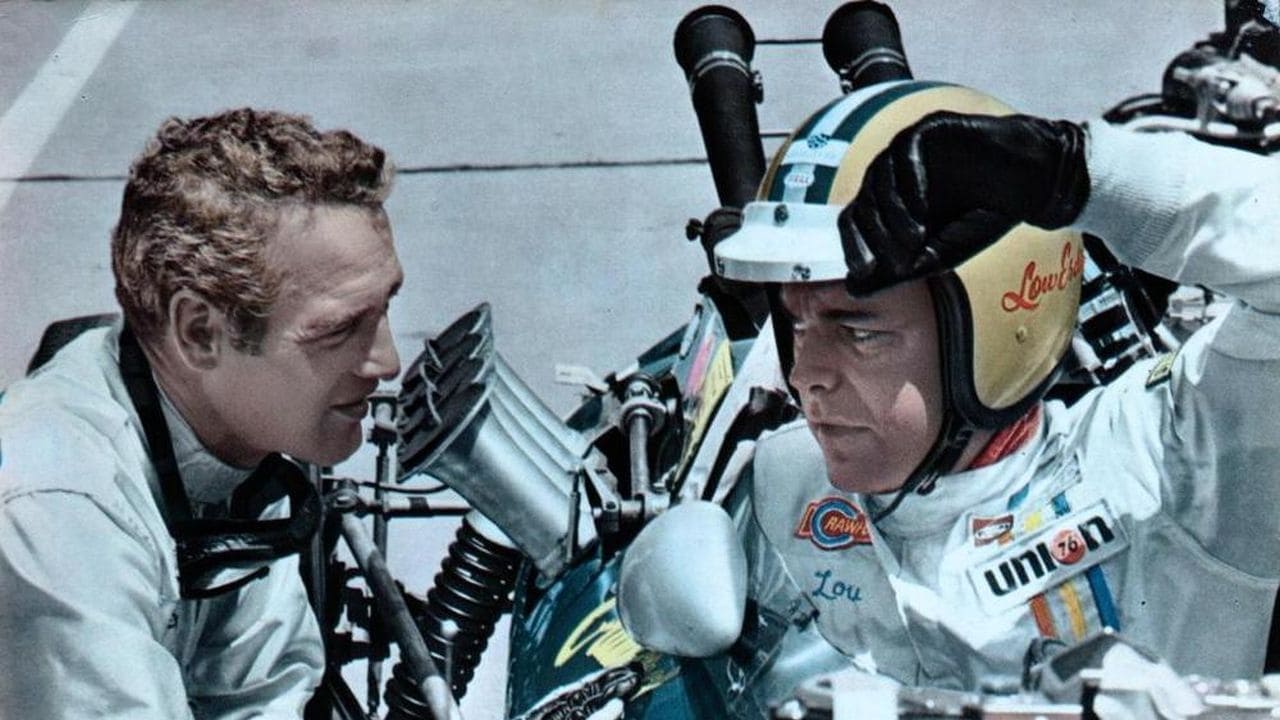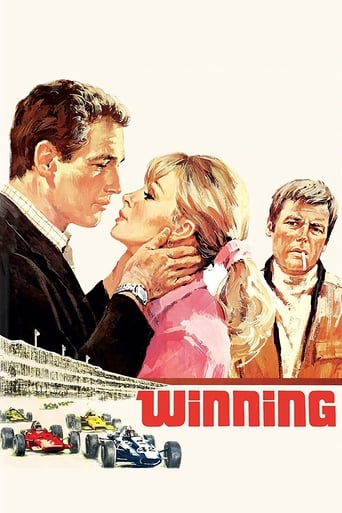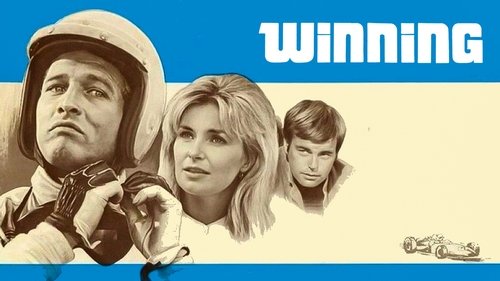Infamousta
brilliant actors, brilliant editing
Huievest
Instead, you get a movie that's enjoyable enough, but leaves you feeling like it could have been much, much more.
Dynamixor
The performances transcend the film's tropes, grounding it in characters that feel more complete than this subgenre often produces.
Rio Hayward
All of these films share one commonality, that being a kind of emotional center that humanizes a cast of monsters.
nzpedals
From very near the start, Newman and Woodward look so comfortable in each others presence. Well, they had been married for eleven years by then! There are other films where the "married" couple just look as though they are acting, and are not real. Here, it is so different and makes watching the rest of it worthwhile, and pleasant.OK, so we know that neither Newman nor Kapua won the 1968 Indy 500, so-what? It is easy to join in the excitement and appreciate the drama. The joining of real footage, especially of the first-lap pile-up is neatly and realistically done.Coping with infidelity is always going to be hard, by both partners, here they do it OK.Richard Thomas as the adopted son is good enough and led me to then watch his simply brilliant "All Quiet on the Western Front".
morrison-dylan-fan
Talking to a family friend about what movies he was planning to pick up after (hopefully) receiving some vouchers for the Christmas season,I was delightfully caught by surprise,when he mentioned the title of a Paul Newman film that my dad had recently picked up.With the UK being hit by the worst storms for 60 years,I felt that it was the perfect time to stay in,and head out on the racetrack.The plot:Walking past a "rent a car" store after winning his latest race,a race car driver Frank Capua finds himself quickly enchanted by the charms of the shops secretary,called Elora.Getting into a whirlwind romance with Elora,Capua soon takes Elora and her son Charlie on the road,and introduces them to the life of a race car driver.Despite Charlie catching the racing bug from Frank very quickly,Elora finds herself completely isolated in Capua's world,which leads to Frank fearing that he may be about to lose the most important race in his life.View on the film:Using a mix of archive and new footage,the editing of the racing scenes by Richard C Meyer (who also co-edited Butch and Sundance) and Edward A. Biery, (who would reunite with director James Goldstone and Newman for When Time Runs Out) sadly give the scenes an annoyingly "shaky" appearance,which along with not allowing the viewer to get a sense of what is taking place,also leads to the pertinaciously thrilling,set-piece scenes lacking any sense of excitement.Set against the racetracks,the screenplay by Howard Rodman gives each of the Capua family members a melodrama race track,which along with featuring some rather unexpected surprises, (such as Newman's reaction to rival driver Luther "Lou" Erding)also perfectly compliments the twilight atmosphere that director James Goldstone covers the movie in.Made just he was catching the racing bug himself,Paul Newman gives a very good performance as Frank Capua,with Newman showing the contrasting sides of Franks life,by having Capua's wide smile that he shows on the race track,fade away,as Frank begins to fear that his marriage is running out of fuel.Joining her real-life husband,Joanne Woodward gives the film a real heart & soul as Elora,with Woodward showing her love for Frank slowly fade away,as she begins to fear that they may be about to go off the race tracks.
Bob-45
I first saw "Winning" in 1969 and was utterly unimpressed with it. When TCM recently showed it, I decided to watch it again to see if my opinion of it had changed after 36 years. Nope. Underwritten, episodic plot line, dull characters , documentary-style, almost indifferent racing footage and, worst, the usual restrained, passionless chemistry between Newman and Woodward. Whatever has kept these two together for almost 50 years remains a mystery. Both Woodward and Newman have shown a playful sexiness with other screen partners (most notably, Woodward in "3 Faces of Eve"). However, I wish they'd given Newman another love interest. About the only high point of "Winning" is Richard Thomas as Woodward's son. Thomas works very well with Newman. Maybe they should have made HIM Newman's love interest. Oh well. I give "Winning" a "5".
Nazi_Fighter_David
Newman is a successful driver who marries a small-town divorcée (Joanne Woodward), soon after they've met… As usual, he devotes too much time to his career and ignores everything else, and, as in "From the Terrace," Woodward turns in desperation to another man—here a rival driver (Robert Wagner). Newman finds them in bed, and becomes estranged from her (again, as in "From the Terrace"), but after winning the big race, he realizes his life is empty, and attempts a reconciliation (the theme of the "winner" who's really a loser).The relationship is superficially written, but Newman and Woodward make us care about it… Their first film together since "A New Kind of Love," it's their best since "The Long Hot Summer." They exude a naturalness, intimacy and spontaneous affection that one suspects come from their own feelings for each other… It is apparent in their first scene, where he is slight1y drunk, delightfully playful, and confident (but no longer unpleasant) in his attempt to pick her up; and she responds with smiles and applause at his tricks with a fireman's hat, but looks slight1y uncertain about this glamorous stranger… Following their wedding, they sit on a swing, drinking beer from cans, talking and laughing quietly… She describes her previous loneliness, and he responds, typically, "Beer's a lot less complicated." They smile, she rubs his back and leans her head on his shoulder: these are people who really know each other, and who have attained a maturity about themselves… Newman exhibits this maturity throughout… His loose, casual style, evident in "Cool Hand Luke," has given way to an almost complete mellowness… Perhaps because of the confidence gained from his directing experience, he has gotten rid of his mannerisms; and except for the intense determination he shows while racing, he's more relaxed than ever before… Although the script tells little about his past, there's a wealth of experience etched into his face, especially in his brilliant, silent reaction to finding the couple in bed—one of quiet resignation that suggests a lifetime of pain and frustration… Newman has many fine scenes of quiet underplaying: his camaraderie with Wagner early in the film; his solitude after the race; his genuine warmth in the relationship with his stepson (Richard Thomas). The scenes in which they drink champagne and come home drunk together project for the first time in Newman's career a really paternal feeling—only vaguely suggested in strikingly similar scenes in "Hud."


